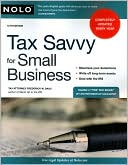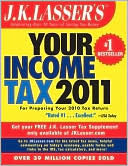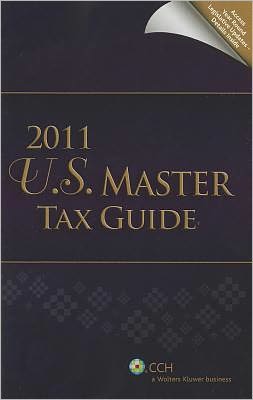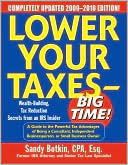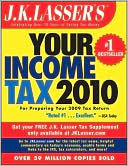Tax Savvy for Small Business
Search in google:
The essential tax-strategy book for entrepreneurs who call themselves "boss."Named a "Best Tax Book" by Entrepreneur magazineDevelop the best tax plan for your small business, learn the ins and outs of the tax code and create comprehensive strategies to get back the most from the IRS. Understanding the tax system is vital to the health of every small business. Virtually every decision a business makes has tax consequences that can affect its bottom line -- and the IRS is always watching.Tax Savvy for Small Business provides essential information that will free up your time and money for what counts -- running your business effectively. It explains how to:deduct current and capitalized expenseswrite off up to $108,000 of long-term assets each yearcompare different business structurestake advantage of fringe benefitskeep records that will head off trouble with the IRSget tax breaks from business lossesdeal with payroll taxesnegotiate payment plans for late taxeshandle an auditget IRS penalties and interest reducedmaximize retirement fundsuse retirement funds as a tax breakThe 14th edition of Tax Savvy for Small Business is completely updated and provides the latest tax breaks, rules, forms and publications. You'll also find a list of the top 25 business deductions - the best deductions to take and how to claim them, trouble-free. Small Business Opportunities The author has more than 20 years experience... Even if you use an accountant, pick up a copy of this book for further understanding and tax management.
I. IntroductionA. Taxes for Small Businesses and the Self-EmployedB. How Tax Law Is Made and Administered: The Short CourseC. Where to Find Tax RulesD. Marginal Tax Rate and Tax BracketsE. The Alternative Minimum Tax (AMT)Part 1: The Basics1. Deductible Business Expenses and IncomeA. What Is a Deductible Business Expense?B. Is It a Current or Future Year Expense?C. Top 25 Deductions for BusinessesD. The General Business CreditE. Vehicle ExpensesF. How and Where to Claim Expense DeductionsG. What Is -- And Isn't -- Income?2. Writing Off Business AssetsA. When Various Expenses May Be DeductedB. Section 179: Expensing Business AssetsC. Depreciating Business AssetsD. Tax Basis of Business AssetsE. Leasing Instead of Buying AssetsF. When You Dispose of Business Assets: Depreciation Recapture TaxG. Tax Errors in Depreciation3. Bookkeeping and AccountingA. Why You Need a Bookkeeping SystemB. Should You Hire a Bookkeeper?C. Manual or Computer System?D. What Kinds of Records to KeepE. How Long Records Should Be KeptF. Bookkeeping Methods of Tracking Income and ExpensesG. Timing Methods of Accounting: Cash and AccrualH. Accounting Periods: Calendar Year or Fiscal Year4. Business Losses and FailuresA. Unincorporated Business LossesB. Incorporated Business Losses5. Tax Concerns of EmployersA. Employer Identification NumbersB. What Are Payroll Taxes?C. Reporting and Depositing Payroll TaxesD. Classifying Workers: Employee or Independent Contractor?E. Misclassifying Employees as IndependentContractorsF. IRS Filing and Payment Requirements for EmployersG. Record Keeping for Your WorkersPart 2: The Structure of Your Business6. Sole ProprietorshipsA. What It Means to Be a Solo -- From a Tax PerspectiveB. To Be or Not to Be -- A SoloC. Solo Income and ExpensesD. Solos' Tax Forms: Schedule C Is Your FriendE. What If My Solo Biz Loses Money?F. How Solos Are TaxedG. Record Keeping for SolosH. When a Solo Closes Up ShopI. Death of a SoloJ. Outgrowing the Solo7. C CorporationsA. Types of CorporationsB. How C Corporations Are TaxedC. Tax Benefits of C CorporationsD. Incorporating Your BusinessE. The Importance of Issuing Section 1244 StockF. Taking Money out of a C CorporationG. Tax Pitfalls of C CorporationsH. Dissolving a C Corporation8. S CorporationsA. An Overview of S CorporationsB. Should You Choose S Corporation Status?C. Tax Reporting for S CorporationsD. How S Corporation Shareholders Are TaxedE. Social Security and Medicare TaxesF. Electing S Corporation StatusG. Revoking S Corporation StatusH. Dissolving an S Corporation9. PartnershipsA. Partnership Tax StatusB. Tax Reporting by PartnershipsC. Tax Obligations of PartnersD. Partnership LossesE. Partnership ContributionsF. Getting Money out of a PartnershipG. Partnership ExpensesH. Selling or Transferring a Partnership InterestI. Ending a Partnership10. Limited Liability CompaniesA. TaxesB. Comparing LLCs With Other EntitiesC. The Limited Liability Company (LLC)D. Terminating a Limited Liability Company11. Qualified Personal Service CorporationsA. Qualified Personal Service Corporations (QSPCs)B. QPSCs & TaxesC. Fringe BenefitsD. Potential Tax ProblemsE. Transferring SharesF. Dissolving a Qualified Personal Service CorporationPart 3: Thinking Small12. Family BusinessesA. The Legal Structure of a Family BusinessB. Income Splitting Lowers TaxesC. A Spouse in the BusinessD. Preserving a Family Business After Death13. Microbusinesses and Home-Based BusinessesA. Business Expenses Incurred at HomeB. Deducting Part of the Cost of Your HomeC. Calculating Your Home Office DeductionD. Tax When Selling the Home OfficeE. A Microbusiness as a Tax ShelterPart 4: Fringe Benefits14. Fringe BenefitsA. How Fringe Benefits Save TaxesB. Retirement BenefitsC. Motor VehiclesD. MealsE. Travel and LodgingF. Clubs and Athletic FacilitiesG. Association Dues and SubscriptionsH. Health BenefitsI. Day Care BenefitsJ. Education BenefitsK. Gifts, Rewards, Discounts, and Free Services for EmployeesL. Adoption AssistanceM.Special Benefits for C Corporation Employees Only15. Retirement PlansA. Advantages of Retirement PlansB. Overview of Retirement Plan TypesC. Details About Each Type of Retirement PlanD. Where to Go for a Retirement PlanE. Potential Tax Problems With Retirement PlansF. Withdrawing Money From Retirement PlansG. Closing Your Business and Your PlansPart 5: Buying or Selling a Business16. Buying a BusinessA. Buying the Assets of a BusinessB. Buying Shares of StockC. Assigning a Price to Business AssetsD. State and Local Transfer Taxes17. Selling a BusinessA. Reporting the Sale of a Sole ProprietorshipB. The Importance of an Arms-Length DealC. How to Protect Yourself From IRS ChallengesPart 6: Dealing With the IRS18. When You Can't Pay Your TaxesA. If You Owe Less Than $25,000B. Getting More Time to PayC. Paying in InstallmentsD. What to Expect When the IRS Gets SeriousE. Dealing With a Monster Tax BillF. When the IRS Can Take Your Assets19. AuditsA. Who Gets Audited?B. How Long Do You Have to Worry About an Audit?C. How the IRS Audits Small BusinessesD. The Auditor's PowersE. Should You Get Audit Help?F. Preparing for Your AuditG. What to Bring to an AuditH. Don't Rush a Field AuditI. What Auditors Look for When Examining a BusinessJ. How to Behave at an AuditK. How to Negotiate With an AuditorL. Your Options After Getting an Audit ReportM. When Your Audit Is Final20. Appealing IRS AuditsA. IRS AppealsB. Contesting an Audit in Court21. Penalties and InterestA. Common Reasons for PenaltiesB. Interest on Tax BillsC. Understanding Penalty and Interest NoticesD. How to Get Penalties Reduced or EliminatedE. How to Get Interest Charges RemovedF. Designating Payments on Delinquent Tax Bills22. Help Beyond the BookA. Finding Answers to Tax QuestionsB. Finding and Using a Tax Pro23. Answers to 25 Frequently Asked Tax QuestionsGlossaryAppendix
